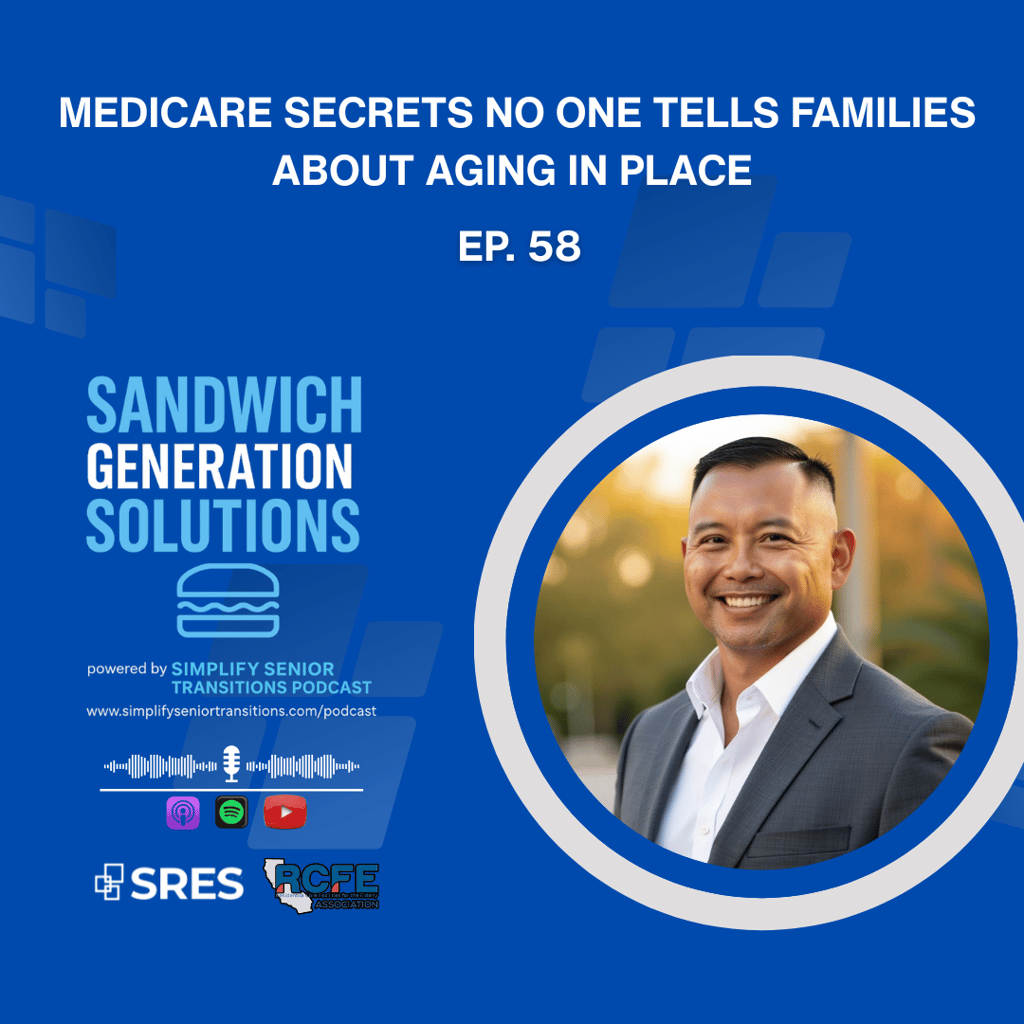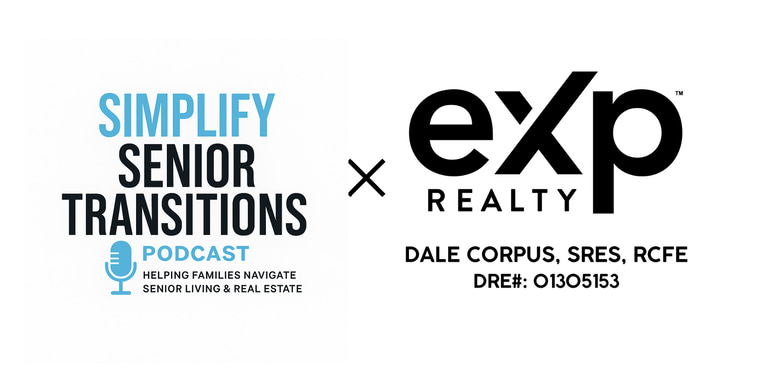Hidden Medicare Secrets Every Bay Area Caregiver Needs to Know
Unlock little-known Medicare benefits that help your parents age in place, save thousands, and buy you more time for major care decisions.
Dale Corpus
9/3/20254 min read
Hidden Medicare Secrets: Your Lifeline for Aging in Place (and Gaining Time for Big Decisions!)
Hey Bay Area caregivers!
Are you part of the "Sandwich Generation," feeling the squeeze between raising your own families and caring for aging parents? You're not alone. Many of us want our parents to stay in their homes as long as possible, but the journey often feels overwhelming and expensive—especially here in the San Francisco Bay Area where care costs are incredibly high. We assume we'll be paying for everything out-of-pocket, from medical equipment to in-home care.
But what if I told you there are hidden Medicare benefits that most families don't know about, which could make a huge difference? These "secrets" can mean the distinction between your parents staying home longer or moving into a care facility before they're truly ready.
In a recent episode of the Simplify Senior Transitions Podcast, senior transition specialist Dale Corpus shed light on these crucial, often-missed supports. Dale, a real estate expert based in the San Francisco Bay Area, provides real stories and practical tips to make caregiving and senior transitions easier.
Here's what you'll learn in this episode:
This episode dives deep into the hidden Medicare benefits that can help seniors age in place, offering support you might not hear about unless you dig for it.
You’ll discover a surprising list of services and equipment that can make home life safer and more manageable—even though Medicare won't cover 24/7 care.
The goal is to empower you with knowledge that can delay or even prevent the need for assisted living, saving your family thousands of dollars and, crucially, buying you valuable time for senior care planning.
Uncovering Medicare's Hidden Support for Staying Home
Home Health Services
Imagine your parent recovering from a fall or illness. Medicare can cover skilled nursing visits for things like wound care, injections, or monitoring. It also includes physical, occupational, or speech therapy after an illness or injury.
These services are short-term but absolutely crucial for recovery. Take Roberto's story, for example: his daughter thought she'd pay for physical therapy after his fall, but Medicare actually covered in-home physical therapy and occupational therapy.
Durable Medical Equipment (DME)
This is a big one for making homes safer. Medicare often partially or fully covers essential items like walkers, wheelchairs, hospital beds, oxygen equipment, and diabetic supplies. Roberto's family discovered Medicare provided a hospital bed and walker, turning what seemed like an overwhelming financial burden into something covered.
Hospice at Home
When a loved one faces a terminal diagnosis, Medicare provides full coverage for hospice care at home. This includes visits from nurses, aides, social workers, and even emotional support for the family.
Short-Term Skilled Nursing Facility Care
If a hospital stay is followed by a need for further recovery, Medicare can cover up to 100 days of skilled nursing facility care, allowing for recovery before returning home.
The Catch and Key Rules You Need to Know
These benefits are powerful, but they are often underutilized because families aren't aware of the rules. Here's the important fine print:
Medically Necessary: Services must be deemed "medically necessary."
Doctor's Order: They usually require a doctor's order or physician authorization.
Short-Term Recovery: These benefits are designed for short-term recovery, not permanent custodial care.
It's vital to understand what Medicare doesn't cover. It won't pay for a 24/7 caregiver, long-term personal care, help with bathing or cooking, or long-term companionship. Assisted living rent is also not covered. These costs still fall out-of-pocket or may be covered by Medi-Cal.
However, by using the covered benefits strategically, families can significantly extend their parents' ability to stay home longer, safer, and healthier.
For instance, Linda's mom had knee surgery, and instead of going straight to assisted living, Medicare covered three weeks of in-home physical therapy, a walker, a shower chair, and nurse check-ins. This allowed her to recover at home, saving thousands and delaying the move to assisted living for several years.
Why This Matters for Bay Area Families
In the Bay Area, where the cost of living and care is astronomical, these benefits are especially valuable. Consider these typical costs:
Private caregiver: $35 to $46 per hour
Retail medical equipment: A hospital bed can cost $3,000
Assisted living: $6,000 to $8,000 per month
If Medicare can cover even a portion of these expenses, families can stretch their resources much further.
This financial relief—and the time it buys—are perhaps the most valuable gifts in senior care planning. This extra time allows you to navigate other significant challenges, such as:
Downsizing a family home
Selling a senior's property
Thoroughly researching and choosing the right long-term care options
Managing the emotional stress that accompanies such major life transitions
Practical Tips to Make Sure Your Parent Doesn't Miss Out
Don't let your family miss out on these vital supports. Here’s how to ensure you leverage Medicare benefits:
✅ Ask Providers Directly: Don't assume. Always ask, "Would Medicare cover this?"
✅ Request Doctor's Orders: Coverage often hinges on physician authorization, so get those orders.
✅ Work with Home Health Agencies: Many agencies are experts at billing Medicare directly.
✅ Don't Wait for a Crisis: If your parent is being discharged from the hospital, ask about Medicare home health before they even leave.
Most families, and even some professionals, don't realize these supports exist because they aren't advertised, and the system is complex. Dale, as a senior transition specialist, sees families miss out on thousands unnecessarily all the time.
Empower Your Family Today
Medicare has hidden benefits for aging in place, covering home health therapy, medical equipment, and hospice. Knowing the rules—doctor's orders and medical necessity—can truly make a difference.
Using these benefits strategically can delay or even prevent the need for assisted living, saving families in the Bay Area thousands.
This episode of Sandwich Generation Solutions is powered by the Simplify Senior Transitions Podcast.
👉 If your loved one is considering senior living and you need to figure out what to do with their home, let’s talk. Schedule a FREE consultation and learn more about Dale's services at www.simplifyseniortransitions.com.
📲 Have a quick question? DM Dale directly on Instagram @soldbydale.
🎧 You can also listen to the full Simplify Senior Transitions Podcast on YouTube, Spotify, Apple Podcasts, and all major platforms.
If you found this helpful, hit like, subscribe, and share it with someone who needs this information!
P.S. Got news or an amazing story to share? Email us at dale.corpus@exprealty.com and you might be featured in our next episode!
Watch The Podcast Here



Transitions Made Simple
Helping seniors transition with ease and peace.
📍 Serving the San Francisco Bay Area
📞 GET IN TOUCH
📬 STAY INFORMED
Dale Corpus, SRES, RCFE
📱 925-380-1657
📧 dale@simplifyseniortransitions.com
🕓 Available for free 15 min consultations by appointment
© 2026. All rights reserved.
Sign up for monthly senior transition tips & real estate insights.
